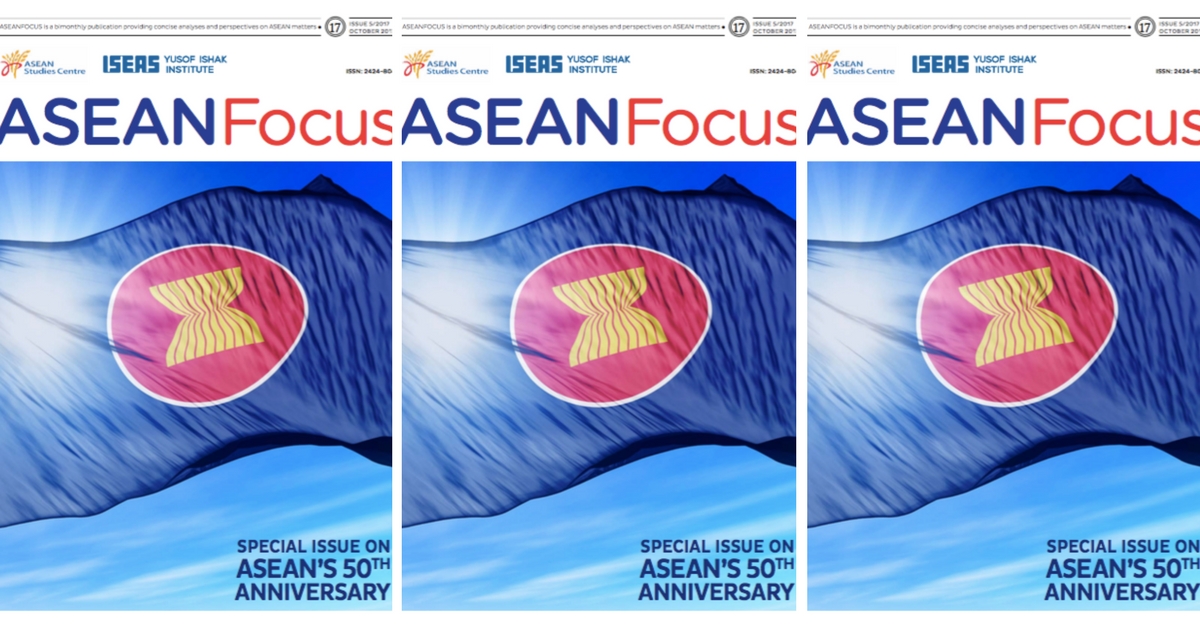
Photo from the cover of ASEAN Focus Special Issue on ASEAN' 50th Anniversary published by the ASEAN Studies Center at ISEAS-Yusof Ishak Institute.
Dr. Aileen S.P. Baviera, Professor at the Asian Center, University of the Philippines, Diliman contributed an essay, ASEAN Centrality 2.0: No Picnic or Tea Party, for ASEAN Focus’s Special Issue on ASEAN’s 50th Anniversary, published October 2017 by the ASEAN Studies Center of the ISEAS Yusof Ishak Institute in Singapore.
Dr. Baviera argues that ASEAN needs to reinvent itself and “[put] its own house in order”. She mentions five objectives that ASEAN must achieve to reclaim centrality.
FIVE REQUISITES THAT ASEAN MUST ACHIEVE TO RECLAIM CENTRALITY
- “ASEAN member states must muster their collective and individual political will to place ASEAN back at the front and center of order-building efforts,” most especially in managing “difficult power transitions on the larger Asia-Pacific stage [that] threaten ASEAN’s hard-won peace and prosperity”
- “Second, ASEAN must continue to exercise and assert its autonomy, and it can only do so by not allowing one or the other major power from undermining its unity or controlling the group from within.”
- “Third, ASEAN must work for and deserve recognition by others of its centrality.”
- “Fourth, ASEAN has proven capability in the management of meetings and agreements; now it must show itself capable in quick response decision-making and in the implementation of commitments and targeted action plans to move security cooperation forward.”
- “ASEAN needs to develop basic foreign policy consensus among its member states, particularly on issues where the region’s “core interests” lie such as the need for an equilibrium among the major powers, or how to best manage maritime disputes in the South China Sea."
Dr. Aileen SP. Baviera is Professor at the Asian Center, University of the Philippines Diliman. She specializes on and writes about contemporary China studies, China-Southeast Asia relations, Asia-Pacific security, territorial and maritime disputes, and regional integration. The editor in chief of the journal, "Asian Politics & Policy," she is the author of many academic publications, including the "The Domestic Mediations of China's Influence in the Philippines," which appears in Rising China's Influence in Developing Asia, edited by Evelyn Goh and published by Oxford University Press. She completed her Ph.D. in Political Science at the University of the Philippines Diliman. VIEW FULL PROFILE.
The UP Asian Center offers M.A. programs in Asian Studies with four fields of specialization: Northeast Asia, Southeast Asia, South Asia, and West Asia. The Center also has an M.A. program in Philippine Studies that allows students to major in Philippine society and culture, Philippine foreign relations, or Philippine development studies. The Center offers a Ph.D. program in Philippine Studies in conjunction with the College of Arts and Letters and the College of Social Sciences and Philosophy. Get an overview of these programs. The Asian Center also houses a peer-reviewed, open-access journal, Asian Studies: Journal of Critical Perspectives on Asia. It has published several books and monographs, and hosts or organizes various lectures and conferences.

